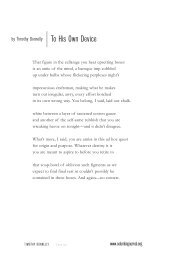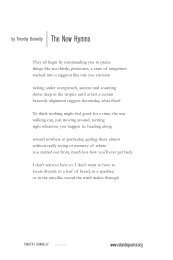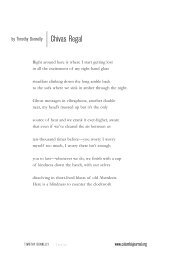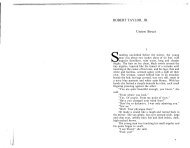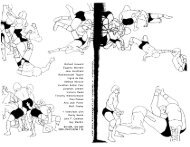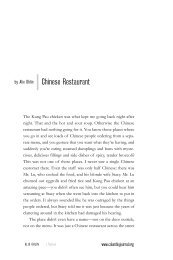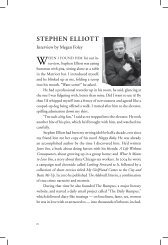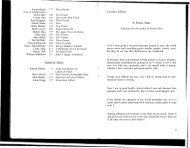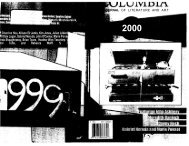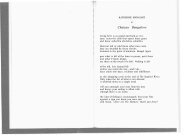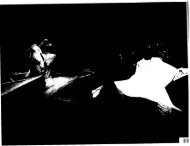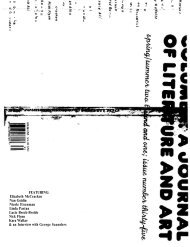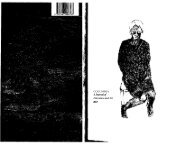Issue 27 - Columbia: A Journal of Literature and Art
Issue 27 - Columbia: A Journal of Literature and Art
Issue 27 - Columbia: A Journal of Literature and Art
Create successful ePaper yourself
Turn your PDF publications into a flip-book with our unique Google optimized e-Paper software.
i78<br />
gave me, which was "Never throw cold water on hot directors.<br />
Let them be as interested as they are going to be with all the ideas<br />
that they have <strong>and</strong>. . .you know you need the money."<br />
There are degrees <strong>of</strong> faithfulness, <strong>and</strong> I think your treatment is<br />
faithful in spirit.<br />
JAMES BOSLEY<br />
I didn't invent any new elements that are so drastic, but at the<br />
same time, I underst<strong>and</strong> where they are coming from with the<br />
prisoner subplot. There's an old saying in the theater, "You never<br />
introduce a loaded gun in act one if you're not going to fire it by<br />
act three." And the prisoners are in a way a loaded gun.<br />
It would be very tempting dramatically to move them into the<br />
story, to move them into the garage. So we're fighting for more<br />
subtlety. The producer's whole thing is "story," <strong>and</strong> it's the<br />
challenge in such a book <strong>of</strong> perception. It's a story about growing<br />
awareness <strong>of</strong> someone who's young <strong>and</strong> innocent but is surrounded<br />
by corruption. Her whole family is corrupted <strong>and</strong> rotting at the<br />
core, but it's about her perception <strong>of</strong> that. Perception is not a visual<br />
thing, whereas film has to be very visual. Trying to make that<br />
subjective story objective has been a challenge.<br />
LISA SHEA<br />
Typically, the director has not read the book <strong>and</strong> does not<br />
want to read the book, but he's read the treatment—which he<br />
adores—<strong>and</strong> in your realigning <strong>of</strong> events, the convicts appear in<br />
the beginning <strong>and</strong> in the book they appear towards the end. In<br />
the book, they move closer to the house throughout the chapter<br />
in which they are contained, but in the script, they appear at the<br />
beginning <strong>and</strong> they continue to advance closer <strong>and</strong> closer to the<br />
house.<br />
JAMES BOSLEY<br />
In their opinion, this growing threat never pays <strong>of</strong>f.<br />
The climax <strong>of</strong> the book is when the father shoots the gun <strong>of</strong>f<br />
vaguely in the wife's direction <strong>and</strong> drives <strong>of</strong>f, <strong>and</strong> the girls <strong>and</strong><br />
their mother gather their things <strong>and</strong> leave. In my version, they're<br />
escaping in the car, <strong>and</strong> they are stopped by the chain gang,<br />
because they are working on the road, <strong>and</strong> while they are waiting,<br />
the father is in his car getting closer <strong>and</strong> closer, <strong>and</strong> he's wearing<br />
his gorilla mask, which he wore in an earlier scene. Whenever he<br />
gets too blown away, he puts this gorilla mask on. So he's in this<br />
car right behind them <strong>and</strong> they've stopped at the chain gang. The<br />
guard knows the mother, because she drives by this chain gang<br />
every day. And the guard kind <strong>of</strong> flirts with her in this mild way.<br />
Then he waves them on, but he stops the father's car <strong>and</strong> sort <strong>of</strong><br />
helps them escape. So they do play a role.<br />
I had to condense the book down to a hundred pages, <strong>and</strong> I<br />
think one <strong>of</strong> the reasons the director should read the book is to<br />
get a sense <strong>of</strong> how the details tell so much <strong>of</strong> the story—what the<br />
girls' totems are <strong>and</strong> the sort <strong>of</strong> amulets to ward <strong>of</strong>f evil around<br />
them, <strong>and</strong> how they put themselves in this bubble <strong>of</strong> play, even<br />
though it is cruel play . . .<br />
It's ritual play.<br />
LISA SHEA<br />
JAMES BOSLEY<br />
And so much <strong>of</strong> their "amulets," the old dolls clothes <strong>and</strong> the<br />
dog <strong>and</strong> these little bits <strong>of</strong> their lives—I mean you can't put every<br />
bit <strong>of</strong> that into a treatment. You just have to tell the story as sparsely<br />
as possible.<br />
The WAITRESS appears, delivering food <strong>and</strong> refilling the water glasses.<br />
She lingers silently over the table for a beat, then exits stage right.<br />
LISA SHEA<br />
When I spoke to the director <strong>and</strong> in talking to you too, this<br />
word "story" has grown to the size <strong>of</strong> an elephant. We're all sort<br />
<strong>of</strong> using it for our own purposes. When I spoke with the director,<br />
my impression was that every time he said the word story, he was<br />
talking about action. You can certainly tell a story in a novel<br />
without there being a lot <strong>of</strong> action. You don't need action to tell<br />
a story novelisitcally.



